1905 exclusive planning: big data report of movie box office in the first half of 2017

Special feature of 1905 film network In the first half of 2017, the film market was mixed, with record box office results, rising online ticket sales rate, and improving cinema infrastructure. At the same time, major cinemas played M&A cards one after another, which made the movie market more diversified. However, although domestic films have a high reputation, they are still impacted by imported blockbusters.
Worldwide, China’s film market continues to maintain the position of the second ticket warehouse in the world, and the "Belt and Road" has promoted the smooth achievement of multi-country co-production projects, and promoted China’s film market to gradually occupy an important position in the world.
Let’s summarize and review the growth of China film market in the first half of 2017 through the data of the past six months.
The national market data has reached a new high, and the proportion of online sales has surged and moved into the mainstream.
As of June 30, 2017, the cumulative box office of the China mainland film market reached 27.177 billion yuan, an increase of 10.51% over the same period; 781 million people watched movies, an increase of 8.02% over the same period; The number of screenings reached 44.58 million, an increase of 28.81% over the same period, with an average audience of 18 people.
In the first half of 2017, a total of 221 films were released, 36 more than the same period of last year, including 169 domestic films, up 17.36% over the same period, and 52 imported films, up 26.83% over the same period. Although the number of domestic films is much higher than that of imported films, the box office data is inversely proportional. The box office of imported films with 16.743 billion yuan far exceeds that of domestic films with 10.394 billion yuan.
Among them, the imported film Speed ? ? and Passion 8 ranked first with 2.669 billion yuan, and the domestic films Kung Fu Yoga and Journey to the West were ranked second and third with 1.753 billion yuan and 1.656 billion yuan respectively. It is worth mentioning that,The imported films in this year’s list are not only American films, but also the phenomenal Indian film Wrestling! Dad ranked fourth with 1.29 billion as a dark horse.. However, among the top ten films in the first half of the year, only three domestic films were on the list ("Braving the Wind and Waves" ranked tenth with 1.049 billion yuan), and all of them were New Year movies. For domestic films, they need to make continuous efforts in the second half of the year to become the darling of the market.
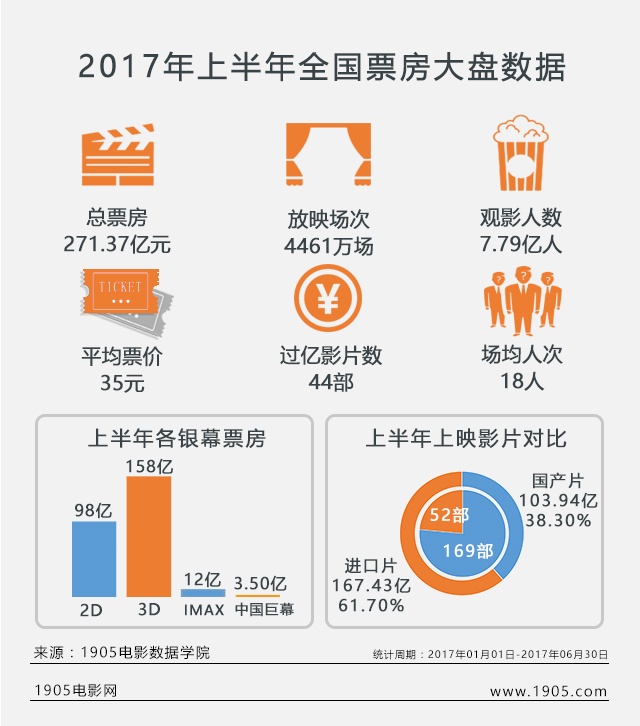
In the first half of 2017, the schedules have risen and fallen.During the Spring Festival, the four films, Journey to the West, Enchanting Demons, Kung Fu Yoga, Making a Big Fight in Tianzhu and Riding the Wind and Waves, were evenly matched, and many films earned over 100 million yuan at the box office, up 10.94% over the same period.; Tomb-Sweeping Day File received 594 million yuan, up by 1.37% over the same period, boosted by high-profile films such as Kong: Skull Island and The Dedication of Suspect X; The May 1st file finally closed at 784 million yuan, up by 19.15% over the same period, relying on the sweeping upsurge of Speed and Passion 8 and the excellent works of word of mouth such as Memory Master and Bomb Demolition Expert.
On the other hand, the New Year’s Day file lacked phenomenal blockbusters such as last year’s mr. six and detective chinatown, which closed at 497 million yuan, down 42.41% over the same period. The Oscar hit film la la land was tepid, and the Valentine’s Day file finally closed at 393 million yuan, down 34.93% over the same period. Last year, Warcraft, X-Men: Apocalypse and other films dominated the Dragon Boat Festival market, but this year’s Dragon Boat Festival only featured Pirates of the Caribbean 5 and Wrestle! The two films "Dad" grossed over 100 million yuan and finally closed at 759 million yuan, down 10.39% in the same period.
It is worth mentioning that online sales accounted for 83.66% in the first half of this year, up 13% over the same period. With the rapid development of information technology, moviegoers are more inclined to use mobile devices to purchase tickets, and the upsurge of ticket replacement during the Spring Festival period is a great boost to the box office of the Spring Festival. Even after the Spring Festival, online ticket sales still occupy the mainstream position and the market prospect continues to rise.
The wave of cinema mergers and acquisitions has boosted industrial development, and the number of screens in China has surged to catch up with North America.
In the first half of 2017, 460 cinemas were added, with 2,584 screens added, with an average daily increase of 14 screens. After the explosive growth of cinemas in China last year, the infrastructure construction of cinemas slowed down significantly this year. With the rapid development of China cinema infrastructure in recent years,The number of movie screens in China has exceeded 45,000, surpassing North America (US+Canada) to become the country with the largest number of movie screens in the world..
In terms of cinemas, Evergrande bought more than 400 million Meijia studios at the beginning of the year, and then Dadi bought Orange Sky Golden Harvest and Wanda Cinema increased its capital by 300 million yuan to Bona Film. Several major cinemas have joined the M&A boom, which has further boosted the leap-forward growth of major cinemas.
In the first half of the year, the box office of 35 cinemas exceeded 100 million yuan, two more than that of the same period last year. Among them, Wanda Cinema ranked first with 3.614 billion yuan, up 9.95% in the same period, Guangdong Dadi was the second runner-up with 2.3 billion yuan, up 15.12% in the same period, Shanghai United rose from the fourth place to the third place with 2.194 billion yuan, up 22.91% in the same period last year, and China Film Stellar dropped from the third place to the sixth place.
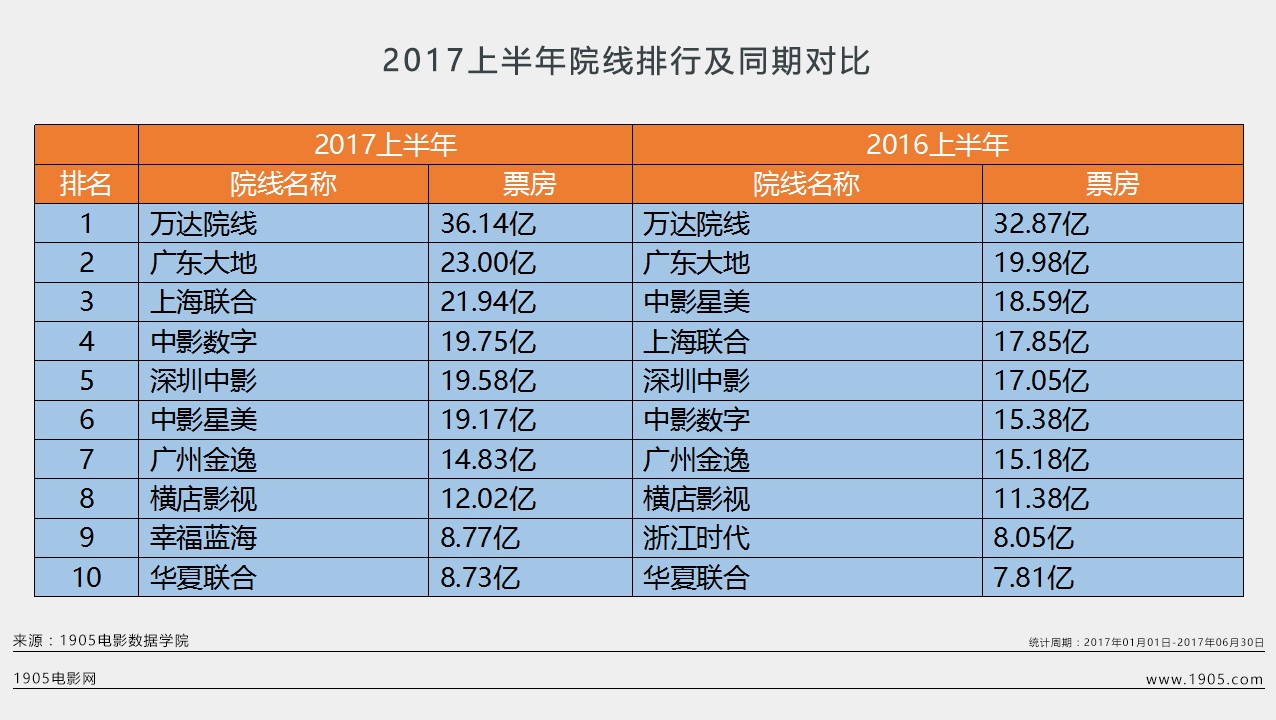
In terms of regions, Guangdong Province ranked as the most popular movie-watching city in China with a box office of 3.904 billion, followed by Jiangsu Province with 2.524 billion, and Zhejiang Province ranked third with 2.102 billion.Shanghai and Beijing, the champions and runners-up in the same period last year, fell to fourth and fifth places.The box office was 1.683 billion and 1.569 billion respectively.
The film market in first-tier cities continued to be saturated, and the box office proportion continued to decline, accounting for only 22.10%. Second-tier cities continued to be the mainstay of the film market, accounting for 36.82%. Cities below the third tier continued to expand, accounting for 41.08%, with an increase of 13 percentage points over the same period. With the gradual improvement of cinema infrastructure in various regions, the film market below the third tier gradually occupied the main position in the national film market.
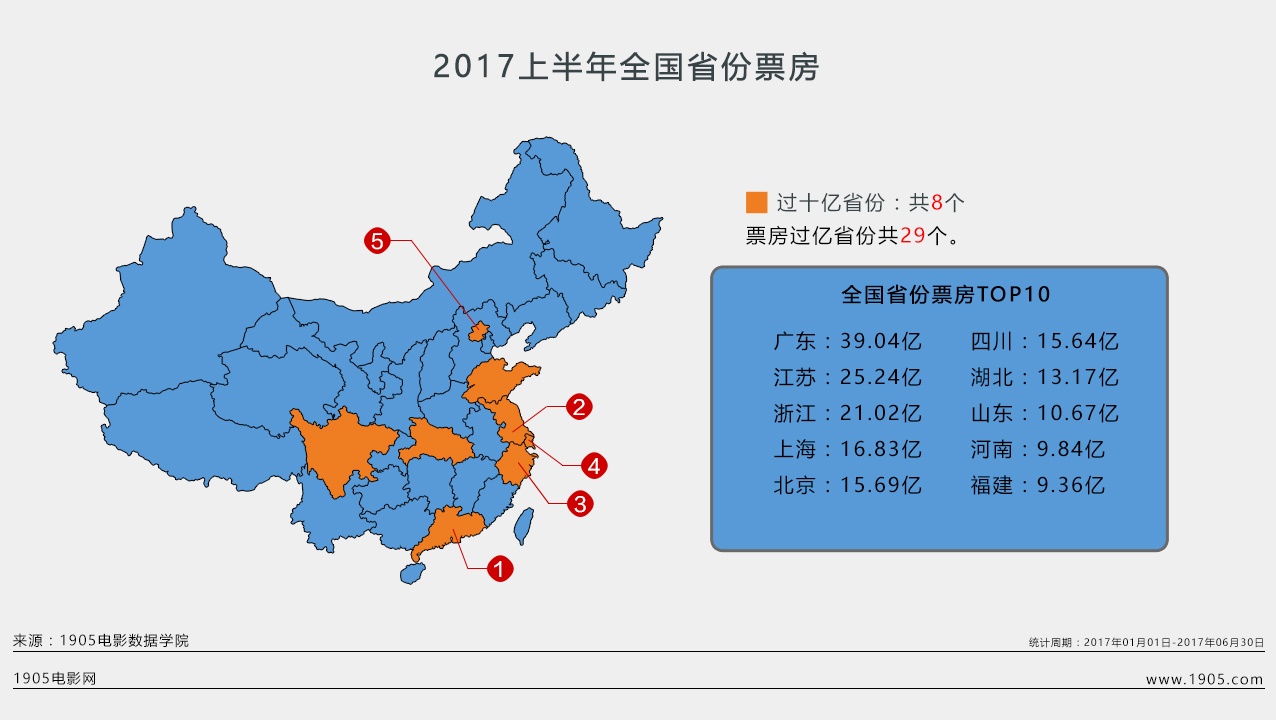
China is the second largest ticket warehouse in the world, and the local films in the Japanese film market are the best.
Looking at the global movie market in the first half of 2017, the United States maintained the first ticket warehouse in the world with a box office of US$ 5.521 billion, followed by China with US$ 2.968 billion, followed by Japanese with US$ 689 million. In terms of films, 455 films were released in Japan in the first half of the year, ranking first in the number of films released, followed by 318 films released in the United States and 221 films released in China.
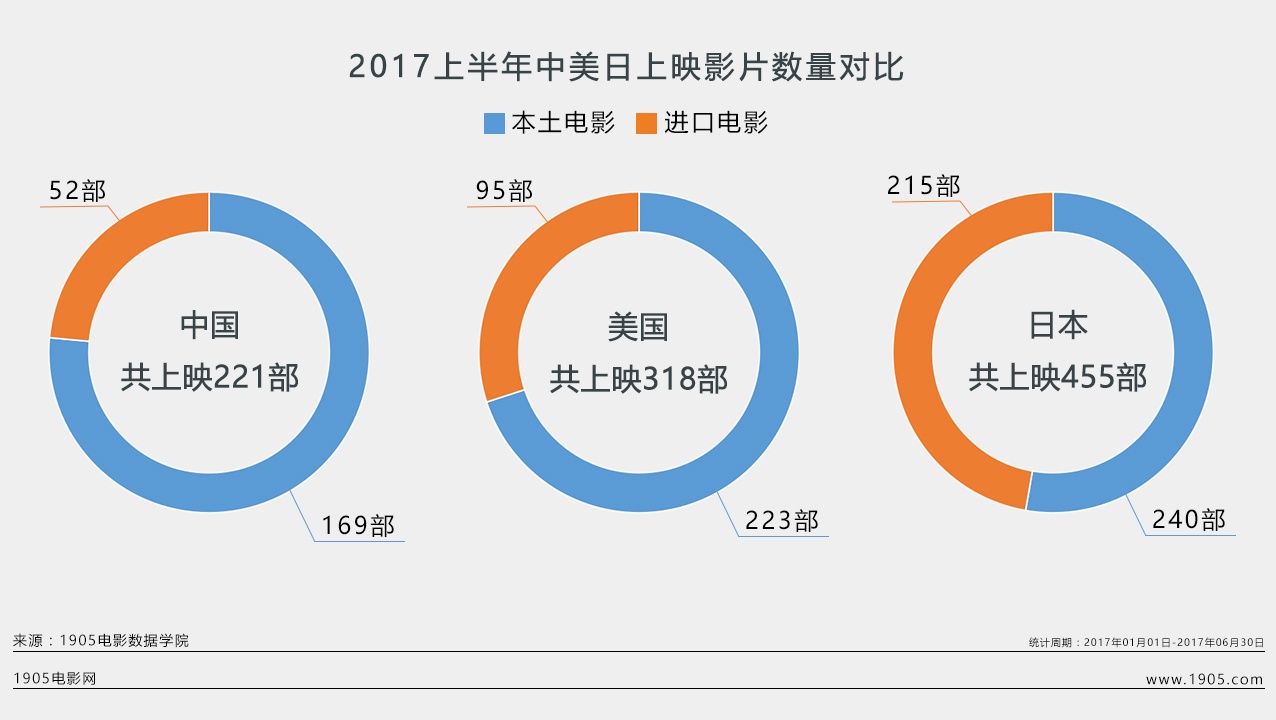
Why are there nearly twice as many films released in Japan as in China, but the box office results are less than half of those in China? Looking at the film list of these three countries in the past six months, the number of local films in China and the United States is more than 70%, while the proportion of local films in Japan is only 52.75%. Look at the TOP10 box office lists of these three countries in the past six months. In the China film market, except for the box office dark horse Indian movie Wrestling! Dad, domestic films only occupy three seats, and they are all New Year movies. The other box office blockbusters have a lot of overlap with the American list. On the other hand, in the Japanese list, it seems that the global blockbuster visual effect blockbusters are not popular, and more movies are wildly changed and imported animated films are popular. Beauty and the Beast, which earned only $87.16 million in China, won the box office in Japan for seven weeks with $102 million.
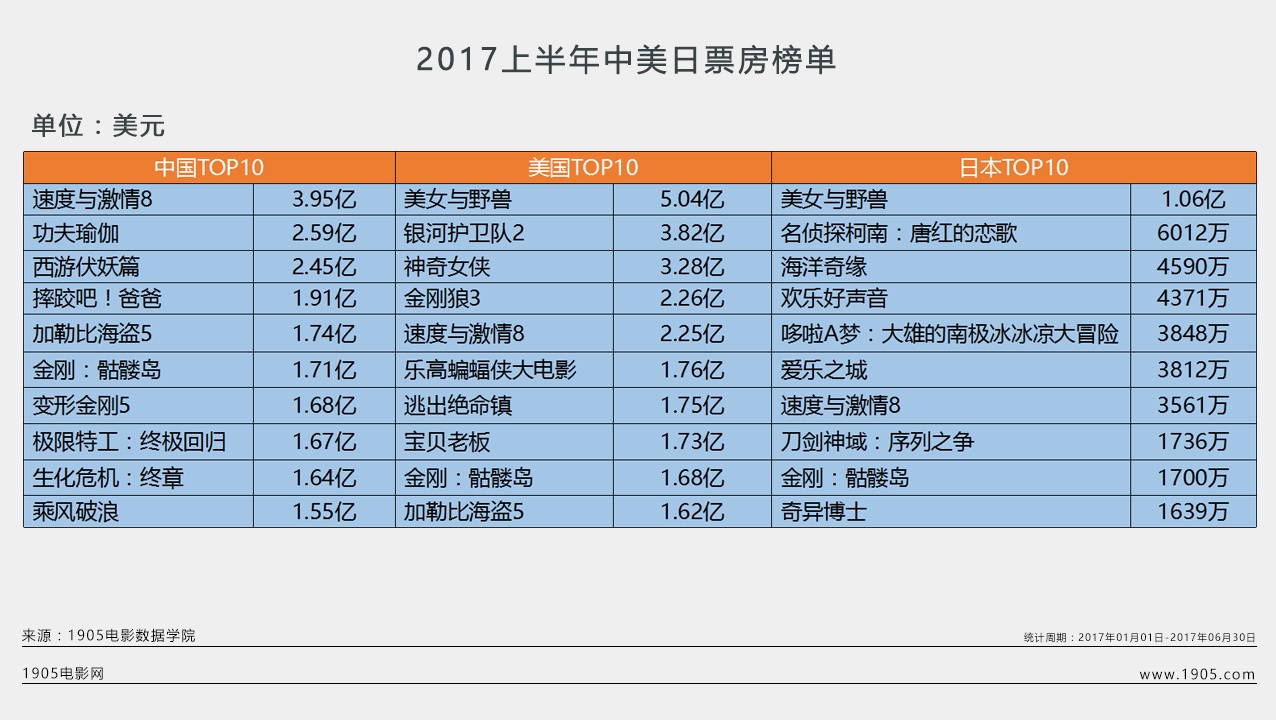
It can be seen that the films that Chinese and American moviegoers choose to watch tend to be assimilated gradually, supplemented by the rapid development of the film market infrastructure, which makes China’s film market occupy the forefront of the world year by year, while Japan, as a comic empire, has long been influenced by its nationals’ comics and has changed its mature film industry, which makes it difficult for foreign films to gain a foothold in the Japanese market.
The number of filings has shown a downward trend, and the "Belt and Road" has driven the prospects of co-production in many countries.
According to the filing and project announcement announced by the Film Bureau of the State Administration of Press, Publication, Radio, Film and Television, a total of 1,374 films were filed in the first half of 2017, down 8.40% over the same period, including 39 co-productions, down 17.02% over the same period.
Although the number of films on record has decreased, look at the film list in detail.The countries involved in co-production (excluding Hong Kong, Macao and Taiwan) have gradually expanded from the most common countries such as the United States and South Korea to countries such as Britain, France, Russia, New Zealand and Australia.And this year’s "Belt and Road" summit forum has promoted the co-production project of Kazakh Musician and the smooth development of the co-production project of five countries (Brazil, Russia, India, South Africa) of "Where is the Time", which has taken an important step for the international cooperation of China’s film market.
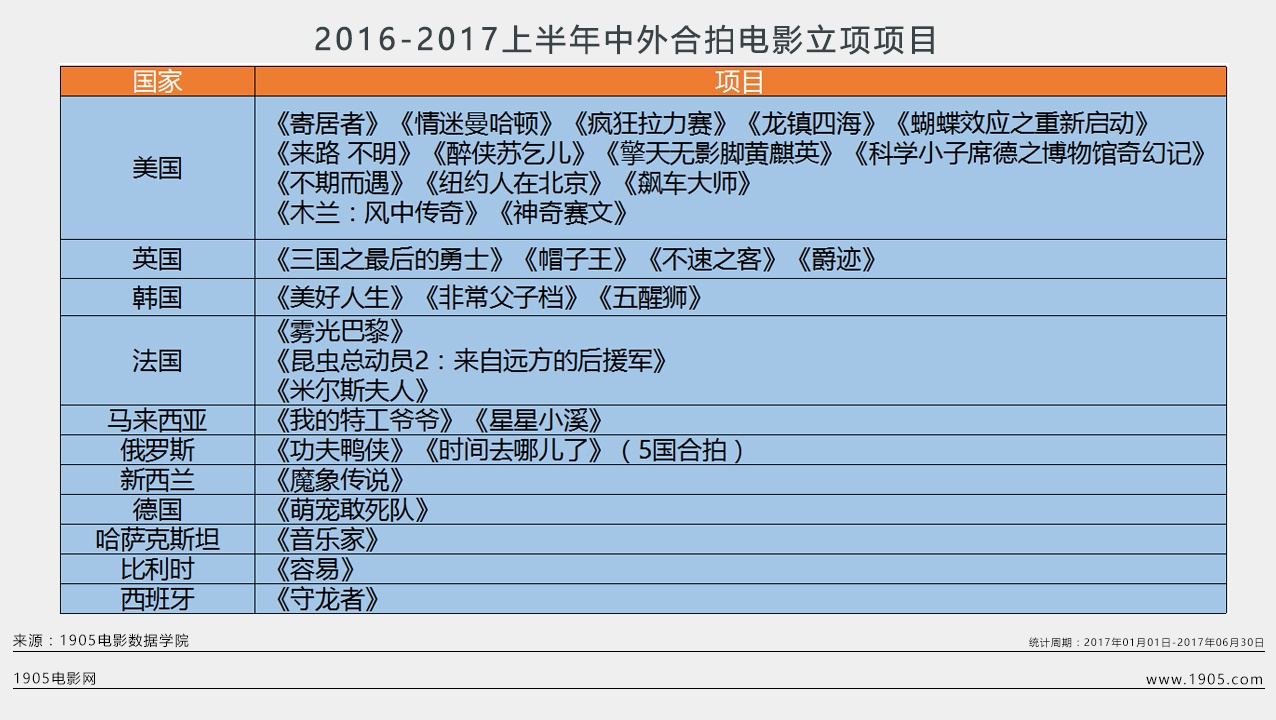
The implementation of the Film Industry Promotion Law has boosted China’s film industry into an era of legal development.
On March 1st this year, the People’s Republic of China (PRC) Film Industry Promotion Law was officially implemented, which is the first regulation in the field of domestic cultural industry. It not only clarifies that the upper limit of box office fines for tax evasion and concealment is as high as 500,000, but also writes morality and art into the law for the first time, requiring employees to strengthen self-discipline and establish a good social image.
After the implementation of the "Promotion Law", the film authorities launched a severe law enforcement action in accordance with the law. On March 21, the National Film Market Special Governance Office notified the punishment results and imposed severe punishment on the first batch of 326 cinemas with illegal business practices, of which 126 cinemas closed down for rectification.
At the same time, Wolverine 3: World War I, which was released on March 3, became the "first person to eat crabs". For this film, both the film maker and the cinema received such a notice in advance: it is necessary to indicate in a prominent position in the online and offline ticket window that "primary school students and preschool children should watch with their parents". Since then, the film industry in China has entered an era of legal development.
To sum up, in the first half of 2017, the film market as a whole showed a steady rise, and the implementation of the Film Industry Promotion Law further stabilized the legalization process of China film market. Looking forward to the film market in the second half of the year, summer movies are not only strongly impacted by imported blockbusters such as Daddy Thief 3, Spider-Man: The Return of Heroes, but also domestic movies are unwilling to lag behind. High-profile blockbusters such as The Story of Wukong, The Story of daoist magic and The Story of the Demon Cat take turns, which helps the domestic movies that were slightly behind in the first half of the year to break out and regain the mainstream of the market.